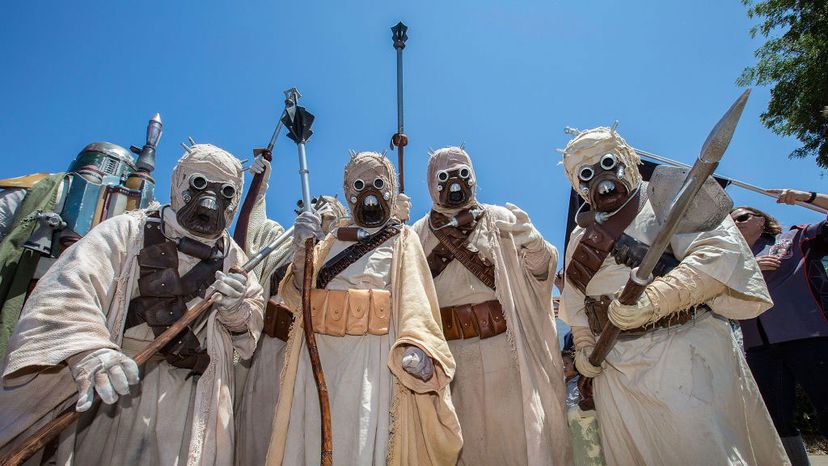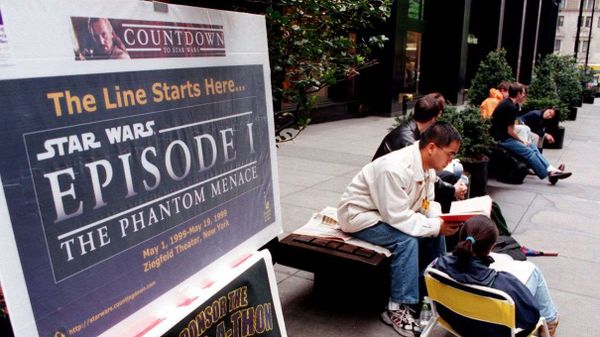
Until January 1997, George Lucas was the barely fallible god of geekdom thanks to "Star Wars." Sure, a few vocal fans had quibbles about ewoks, but, for the most part, George Lucas had given the world a brand-new mythology. The Campbellian hero's journey spoke to a generation about the need to slay one's personal demons and fight an evil empire for the greater good.
But Lucas went back to tinker with the films that had made him famous and, in the early months of 1997, released the "Star Wars: Special Edition." Though some fans wondered at the wisdom of making changes to a 20-year-old movie, this re-release brought in hundreds of millions of dollars and thousands of new "Star Wars" fans. This was the beginning of the end of George Lucas's honeymoon with fans and the beginning of fractures in fandom.
Advertisement
The fractures became full blown breaks just two short years later when the long-awaited prequel, "Star Wars: Episode I - The Phantom Menace" was released. Fandom was split in two. In one camp were, for the most part, an older generation of fans expecting a dark film about the wholesale slaughter of the Jedi. In the other camp you had a generation of kids who had a brand new "Star Wars" film to connect with in a way they'd never previously been able to. Between them was a brand-new internet to fight with.
"Generational splits occur in the fandom for the same reason they occur in general culture," Bobby Roberts, a mainstay in the "Star Wars" community and an editor at the Portland Mercury News, told us by email. "People tend to be more conservative the older they get, and change becomes seen as an intrusion into a routine rather than a progression into a better future."
Over time, that vocal dislike of "The Phantom Menace" and the rest of the prequels has receded as the younger fans got older and obtained more of a voice in the culture, but these generational splits aren't the only ones in "Star Wars" fandom.
In some places, these splits were more toxic. As "Star Wars" entered a new phase with "The Clone Wars" cartoon series, a new generation of kids found "Star Wars" as a cartoon and didn't care about as much about the movies. And they found their fandom in a female character named Ahsoka, voiced by Ashley Eckstein. Then "The Force Awakens" came along was and Daisy Ridley's character of Rey brought the longtime female fans of the saga front and center. Some people cried, loudly, that "Star Wars" wasn't for the fans anymore, and these changes were somehow ruining "Star Wars."
Tracy Duncan runs the popular "Star Wars" fansite Club Jade and emailed to shed some light on this, explaining that female fans have always been there. "I'm nearly 40 and I've been here since I was 16 and I know women who saw 'A New Hope' in '77 when they were 16 and are still fans."
Women simply found their own, quiet places to congregate, but social media broke down those barriers, causing lots of friction. "The walls between these various parts of fandom are coming down. The more women you see publicly espousing fandom, the more willing others are to come forward," says Duncan.
Sexist fans weren't the only ones complaining. White supremacist fans came out in force to decry John Boyega's casting in "The Force Awakens." Other swarms of fans claimed to be "true fans" because they liked or disliked specific parts of the story and anyone who says otherwise is a "fake fan."
"There will always be jerks," Duncan warned. "Sometimes those jerks will be us. That's just human nature, and there's no cure for that. I see a lot of real viciousness out there, which may have more to do with the general cultural wave than anything specific to fandom."
As long as more "Star Wars" keeps coming out, there will be rifts widened and bridges built. "Star Wars" fandom is getting better, but every lazy, cheap Jar Jar Binks joke in an article or loud complaint about female heroes takes fans one step further from the finish line.
Roberts reminded us, like Qui-Gon Jinn in "The Phantom Menace," that in "Star Wars" and in fandom, "'Your focus determines your reality.' Fandom's always going to seem like a tattered wreck of warring opinions if all you focus on are the myriad disagreements. Focus on the good voices, the helpful voices, the open, considerate, thoughtful voices. It helps drown out the mean-spirited, divisive rabble."
Advertisement
